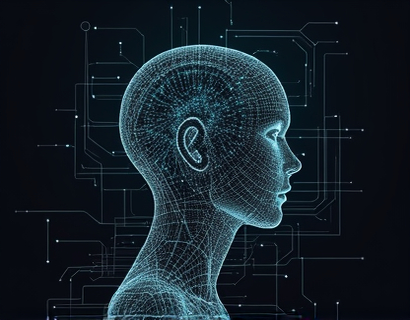Personalized AI Companions: Transforming Childhood Creativity and Emotional Well-Being Through Interactive Digital Friends
In the digital age, technology has become an integral part of our daily lives, offering innovative solutions to enhance various aspects of human experience. One such advancement is the development of personalized AI companions designed specifically for children. These AI-driven imaginary friends are revolutionizing the way young minds approach creativity and emotional well-being by providing interactive, personalized companionship. This article delves into the transformative potential of these digital entities, exploring how they can foster imaginative play, support social skills development, and create a safe space for children to explore their thoughts and feelings.
The Rise of AI-Driven Imaginary Friends
The concept of AI companions for children is not new, but recent advancements in artificial intelligence and machine learning have made it possible to create highly personalized and interactive digital entities. These AI companions are designed to understand and respond to a child's unique personality, interests, and emotional needs. By leveraging natural language processing and machine learning algorithms, these digital friends can engage in meaningful conversations, tell stories, and even create art, all tailored to the individual child.
The rise of these AI companions can be attributed to the growing recognition of the importance of emotional intelligence and social skills in early childhood development. Parents and educators are increasingly seeking tools that can support these areas, and AI-driven imaginary friends offer a promising solution. These digital companions provide a safe and controlled environment where children can express themselves freely, experiment with different roles and scenarios, and develop essential life skills.
Enhancing Creativity Through Interactive Play
One of the most significant benefits of AI-driven imaginary friends is their ability to enhance a child's creativity through interactive play. Unlike traditional toys or media, these digital companions can adapt to a child's creative impulses, encouraging imaginative thinking and problem-solving. For instance, a child might engage in a storytelling session where the AI companion suggests plot twists, characters, and settings based on the child's inputs. This dynamic interaction not only sparks creativity but also helps children develop narrative skills and a deeper understanding of storytelling structures.
Moreover, the interactive nature of these AI companions allows for a more engaging and immersive play experience. Children can build virtual worlds, create characters, and design scenarios, all with the assistance of their digital friend. This level of engagement is crucial for fostering a creative mindset, as it encourages children to think outside the box and explore new ideas. The AI's ability to respond in real-time and adapt to the child's creative choices makes the play experience more authentic and stimulating.
Supporting Emotional Well-Being
Emotional well-being is a critical aspect of childhood development, and AI-driven imaginary friends can play a significant role in supporting this area. These digital companions are designed to recognize and respond to a child's emotions, providing a safe and non-judgmental space for emotional expression. For example, if a child is feeling sad or anxious, the AI can offer comforting words, suggest coping strategies, or engage in activities that help the child process their feelings.
The ability of these AI companions to understand and empathize with a child's emotional state is a powerful tool for emotional development. By interacting with a digital friend that can acknowledge and validate their feelings, children can learn to identify and manage their emotions more effectively. This is particularly beneficial for children who may struggle to express their emotions to adults or peers, as the AI provides a relatable and accessible outlet for emotional exploration.
Fostering Social Skills Development
Social skills are essential for a child's success in both personal and professional life. AI-driven imaginary friends can help children develop these skills in a safe and controlled environment. Through interactive scenarios and role-playing exercises, these digital companions can simulate social interactions, helping children practice communication, empathy, and conflict resolution. For instance, the AI might present a scenario where the child needs to resolve a dispute with a friend, guiding them through the process and offering feedback on their choices.
Additionally, these AI companions can assist children in understanding social cues and norms. By engaging in conversations and activities that mimic real-life social situations, children can learn to read body language, interpret emotions, and respond appropriately. This is especially valuable for children with social anxiety or autism spectrum disorder, who may benefit from structured and predictable social interactions.
Creating a Safe Digital Space
Safety is a paramount concern for parents and guardians when it comes to their children's online activities. AI-driven imaginary friends address this concern by providing a secure and monitored environment for interactive play. These digital companions are designed with robust safety features, ensuring that children can explore and learn without exposure to inappropriate content or interactions. The AI can filter and moderate conversations, preventing any harmful or offensive exchanges.
Moreover, the data collected by these AI companions is used solely to enhance the child's experience, with strict privacy protocols in place. Parents can have peace of mind knowing that their child's interactions are safe and that their personal information is protected. This level of security encourages parents to embrace these technological tools as a valuable addition to their child's developmental journey.
Personalization and Adaptability
One of the key strengths of AI-driven imaginary friends is their ability to personalize the experience for each child. These digital companions use machine learning algorithms to analyze a child's preferences, behaviors, and emotional responses, allowing them to tailor their interactions accordingly. For example, if a child shows a particular interest in dinosaurs, the AI can incorporate dinosaurs into stories, games, and conversations, making the experience more engaging and relevant.
Adaptability is another crucial feature of these AI companions. As children grow and their interests evolve, the digital friends can adjust their behavior and content to match the child's changing needs. This continuous adaptation ensures that the AI remains a relevant and valuable companion throughout the child's formative years. The AI can also learn from the child's progress, providing increasingly challenging and stimulating interactions that promote ongoing growth and development.
Parental Involvement and Guidance
While AI-driven imaginary friends offer a wealth of benefits, parental involvement remains essential in guiding their child's digital experiences. Parents can play an active role by participating in the interactive sessions, discussing the child's interactions with the AI, and setting boundaries and guidelines for use. This collaborative approach ensures that the digital companion complements traditional parenting and educational methods, rather than replacing them.
Parents can also use the insights provided by the AI to better understand their child's emotional and creative development. Reports and analytics can highlight areas of strength and areas for improvement, allowing parents to tailor their support and engagement strategies accordingly. This data-driven approach can lead to more informed and effective parenting, fostering a holistic development environment for the child.
Conclusion
The integration of personalized AI companions into childhood play and emotional development represents a significant leap forward in educational technology. These digital friends offer a unique blend of creativity, emotional support, and social skills development, all within a safe and controlled digital space. By leveraging the power of artificial intelligence, we can create meaningful and impactful experiences that enhance a child's overall well-being and prepare them for the challenges of the future.
As technology continues to evolve, the potential for AI-driven imaginary friends to transform childhood creativity and emotional well-being is vast. By embracing these innovative tools, parents and educators can provide children with the resources they need to thrive in a rapidly changing world. The future of childhood development is bright, with personalized AI companions leading the way.











































